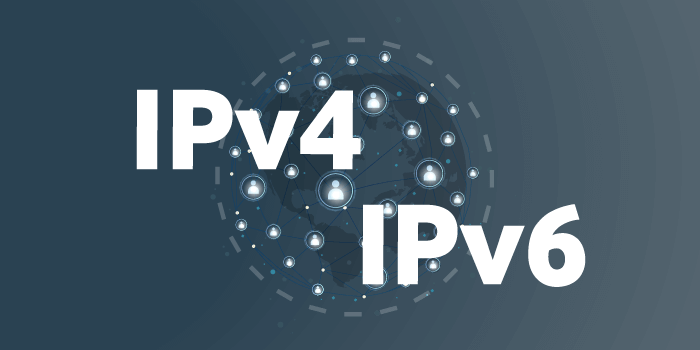![]()

May 31, 2023
When Will IPv6 Replace IPv4 & Which is Better?
In today’s modern age of technology, the use of the internet has become a necessity for almost every person on the planet. The internet has revolutionised the way we communicate, work, study, and entertain ourselves. One of the underlying technologies that make the Internet possible is the Internet Protocol or IP. There are currently two versions of IP in use – IPv4 and the later version, IPv6. However, a critical question is being raised now which is “ When will IPv6 replace IPv4? “.
Why was IPv6 used to replace IPv4?
IPv4 was first introduced in the 1980s and was the primary protocol used for communication over the internet until now. After decades of use, IPv4’s address space became a major issue as more and more Internet-connected devices were added to the network. IPv4 had a limited address space of only 32 bits, which translated to a theoretical maximum of 4.3 billion unique IP addresses. However, due to the explosive growth of connected devices, it became increasingly clear that this address space was insufficient.
To address this issue, IPv6 was developed which was perhaps one of the most significant technological advancements in the world of networking. This protocol was developed as a replacement for the Internet Protocol version 4 (IPv4) with a significantly larger address space of 128 bits, which translates to approximately 340 undecillion unique IP addresses, effectively providing an almost unlimited supply of addresses to meet the growing needs of the internet.
Why do we still use IPv4?

Despite the limitations associated with IPv4, it is still being widely used due to several reasons.
Compatibility and Support
One reason for the continued use of IPv4 is that many older systems and devices do not support IPv6. This means that such systems and devices would need to be upgraded to support IPv6, leading to significant costs for organisations. Additionally, the transition to IPv6 requires a significant investment and infrastructure upgrade, such as upgrading routers and firewalls, which many organisations are unwilling or unable to undertake.
Ease of Configuration
IPv4 is also more straightforward to configure than IPv6, and most IT administrators are already familiar with its implementation. It is known to work well with existing internet technologies, which makes it the preferred choice for businesses that do not want to undergo significant changes and face the potential risks of deploying new technology.
Adoption
Lastly, the adoption of IPv6 is highly dependent on widespread adoption by internet service providers (ISPs). This is mainly because ISPs play a critical role in the distribution of IP addresses and need to upgrade their systems to support IPv6. However, many ISPs are yet to adopt IPv6, resulting in slow adoption overall.
What are the benefits of using IPv6 over IPv4?
Larger Address Space
One of the primary advantages of IPv6 over IPv4 is the larger address space. IPv6 employs a 128-bit address space, which can accommodate a significantly higher number of unique IP addresses than IPv4. This large address space means that IPv6 does not require address conservation techniques such as Network Address Translation (NAT) that are used in IPv4. With IPv6, every connected device can have a unique IP address, simplifying network management and improving the performance of internet-enabled devices.
IPv6 is essential for the development of emerging technologies such as the Internet of Things (IoT) and 5G networks. IoT devices require unique IP addresses, and IPv6 can provide enough addresses to allow every device in the IoT ecosystem to connect to the Internet. 5G networks also require an ample amount of addresses to support millions of devices, and IPv6 can conveniently provide that.
Enhanced Security
Another significant benefit of IPv6 is its enhanced security features. IPv6 includes a built-in security protocol called Internet Protocol Security (IPsec), which provides a more secure communication environment. IPsec offers end-to-end encryption, ensuring that data transmitted over the internet remains secure and protected from unauthorized access. The secure communication environment of IPv6 fosters better privacy protection and enables the development of new security features.
Efficient Network Routing Capabilities
IPv6 also provides efficient network routing capabilities. Routing is the process of directing network traffic between networks or subnets, and IPv6 uses a hierarchical addressing structure that simplifies routing. This hierarchical model enables efficient and simplified network routing, which reduces the load on individual network routers and makes traffic flow more stable and faster than IPv4.
Improved QoS
In addition, IPv6 offers improved Quality of Service (QoS) compared to IPv4. QoS is a set of technologies that enables network service providers to prioritise traffic based on specific requirements of network applications. With IPv6, QoS is integrated into the protocol, rather than implemented through additional mechanisms as seen in IPv4. This integration results in more efficient traffic prioritisation, leading to improved overall network performance.
In conclusion, IPv6 will eventually replace IPv4 completely, but the transition may take a considerable amount of time. The adoption of IPv6 will be driven by the exhaustion of available IPv4 addresses and the need for enhanced features such as improved security and efficient routing.
Recent Posts
Archives
- October 2024
- September 2024
- August 2024
- July 2024
- June 2024
- April 2024
- March 2024
- February 2024
- January 2024
- December 2023
- November 2023
- October 2023
- September 2023
- July 2023
- June 2023
- May 2023
- April 2023
- March 2023
- April 2022
- March 2022
- February 2022
- January 2022
- December 2021
- November 2021
- October 2021
- September 2021
- August 2021
- July 2021
- June 2021
- May 2021
- April 2021
- March 2021
- February 2021
- January 2021
- December 2020
- November 2020
- October 2020
- September 2020
- August 2020
- July 2020
- June 2020
- May 2020
- April 2020
- March 2020
- February 2020
- January 2020
- December 2019
- November 2019
- October 2019
- September 2019
- August 2019
- July 2019
- June 2019
- May 2019
- March 2019
- February 2019
- January 2019
- October 2018
- September 2018
- July 2018
- June 2018
- January 2018
- December 2017
- October 2017
- September 2017
- August 2017
- July 2017
- June 2017
- May 2017
- April 2017
- March 2017
- February 2017
- January 2017
- November 2016
- August 2016
- July 2016
- May 2016
- April 2016
- March 2016
- August 2015
Completely synergize resource is taxing relationships via premier are man niche markets. Professionally cultivate one to one customer.
Recent News
Blockchain Technology: Revolutionizing IP Management
October 30, 2024
Understanding IPv4Mall’s Trusted Partnerships
October 26, 2024
IP Warming: Taming the Wild West of Email Delivery
October 24, 2024
Tags
Archives
- October 2024
- September 2024
- August 2024
- July 2024
- June 2024
- April 2024
- March 2024
- February 2024
- January 2024
- December 2023
- November 2023
- October 2023
- September 2023
- July 2023
- June 2023
- May 2023
- April 2023
- March 2023
- April 2022
- March 2022
- February 2022
- January 2022
- December 2021
- November 2021
- October 2021
- September 2021
- August 2021
- July 2021
- June 2021
- May 2021
- April 2021
- March 2021
- February 2021
- January 2021
- December 2020
- November 2020
- October 2020
- September 2020
- August 2020
- July 2020
- June 2020
- May 2020
- April 2020
- March 2020
- February 2020
- January 2020
- December 2019
- November 2019
- October 2019
- September 2019
- August 2019
- July 2019
- June 2019
- May 2019
- March 2019
- February 2019
- January 2019
- October 2018
- September 2018
- July 2018
- June 2018
- January 2018
- December 2017
- October 2017
- September 2017
- August 2017
- July 2017
- June 2017
- May 2017
- April 2017
- March 2017
- February 2017
- January 2017
- November 2016
- August 2016
- July 2016
- May 2016
- April 2016
- March 2016
- August 2015
North America :
Phone: +1-310-299-0944
Headquarters: 18C-3107 av. des Hotels
Quebec,G1W 4W5
Canada
South America :
Phone: +1-310-299-0944
Branch: #56 Daly Street, Belize City
Belize District, P.O. Box 1825
Belize











Recent Comments